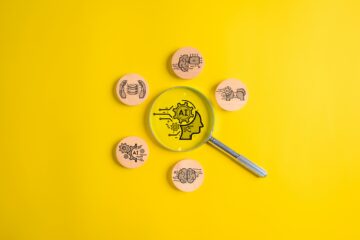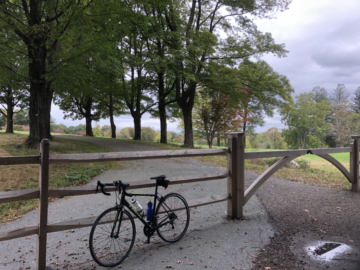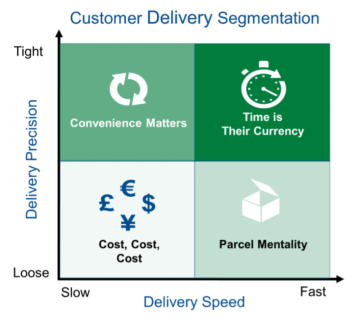
Fab Brasca is an Ironman Triathlete. He is also one of the most knowledgeable and experienced technology executives in the supply chain and logistics industry, especially when it comes to Transportation Management Systems. I first met Fab more than 25 years ago when he was at i2 Technologies, which was later acquired by JDA Software and then became Blue Yonder. After almost 30 years in the technology field, Fab recently launched TriSuccess Advisory, which among other things, provides fractional executive leadership and career/life balance coaching. How has Fab been able to succeed as a business executive and an Ironman triathlete, which both demand a lot of time, energy, and commitment? What lessons has he learned that would benefit other supply chain and logistics professionals? Those are the key questions I discussed with him on a recent episode of Talking Logistics.
Industry Challenges
Before diving into the lessons he’s learned as an Ironman triathlete, I asked Fab to share what he sees as the biggest trends and challenges in the supply chain and logistics software market today.
Fab began by mentioning that with the current economic challenges for shippers and carriers, “We’re in a phase now where organizations are being much more diligent on value and time to value. So, they’re less tolerant about taking a flier on new technology. They first want to make sure the technology works and is actually going to positively impact their business.”
He highlighted two other trends: a greater focus on fiscal responsibility and mergers and acquisitions. Watch the short clip below for his comments:
[embedded content]
“This industry is fun to be in because there is constant change,” Fab says.
Becoming an Ironman
As many of our viewers know, I do century bike rides, which are 100 miles. But doing an Ironman Triathlon — which involves swimming two miles, cycling 100 miles, and then running a full marathon — is a whole different level of competition. I asked Fab how this came about for him.
Fab explains that he was not an athletic kid; it wasn’t until he was in his late teens and early twenties that he started to get involved in athletics. But later, as he got engrossed in his career and started raising a family, he ignored his physical health and reached the point where he needed to lose 30 pounds. So, he started running and competing in duathlons (run-bike-run). The next logical step was to do a triathlon, except he faced a big problem — he didn’t know how to swim, as he shares in the short clip below.
[embedded content]
“It was really about chasing something beyond what I thought was possible and it’s become a passion for me,” says Fab.
Applying Ironman Lessons to Business
What has becoming an Ironman taught Fab about business? He says it’s all about time management and setting priorities.
“If you want to get great at anything, you have to narrow down your priorities to two or three things to focus on,” Fab states. “There may be a lot of things you’d like to do, but going through the exercise of narrowing it down to what’s important and not worrying about if you can’t get to the others is key. Making that decision and finding the time to carry it out is critical. That means you have to take control of your own calendar and manage your priorities accordingly.”
Relieving Stress
A recent survey of our Indago supply chain community found that 65% of respondents say that working in supply chain management is “Stressful” or “Very Stressful.” No surprise there. How does stress management tie into Fab’s Ironman experience?
Fab notes that work/life balance is very important. “Whether it’s family, friends or other activities, you need time away from the job to relieve the stress. That goes back to setting priorities. You have to have ‘you’ time.
“The other thing Ironman training teaches you is grit, the mental fortitude to screen out distractions to focus on the goal. Part of this is breaking things down to smaller intermediate milestones and concentrating on achieving those goals. That is also part of building mental fortitude. And you can apply that to all aspects of your life.”
First Steps
Every journey begins with a single step. So, what does Fab suggest as the first steps to achieve big goals in life and in business? He provides some great advice, so I recommend you watch the full episode for his insights on that question and more. Then post a comment and share your perspective and questions on this topic!
- SEO Powered Content & PR Distribution. Get Amplified Today.
- PlatoData.Network Vertical Generative Ai. Empower Yourself. Access Here.
- PlatoAiStream. Web3 Intelligence. Knowledge Amplified. Access Here.
- PlatoESG. Carbon, CleanTech, Energy, Environment, Solar, Waste Management. Access Here.
- PlatoHealth. Biotech and Clinical Trials Intelligence. Access Here.
- Source: https://talkinglogistics.com/2024/05/08/what-supply-chain-execs-can-learn-from-an-ironman-triathlete/
- :has
- :is
- :not
- :where
- 100
- 25
- 30
- a
- Able
- About
- accordingly
- Achieve
- achieving
- acquired
- acquisitions
- activities
- actually
- advice
- advisory
- After
- ago
- All
- almost
- also
- among
- an
- and
- anything
- Apply
- ARE
- AS
- asked
- aspects
- At
- athletic
- athletics
- away
- back
- Balance
- BE
- became
- because
- become
- becoming
- been
- began
- begins
- being
- below
- benefit
- Beyond
- Big
- Biggest
- Blue
- both
- Breaking
- Building
- business
- but
- by
- Calendar
- came
- CAN
- Career
- carriers
- carry
- Century
- chain
- challenges
- change
- coaching
- comes
- comment
- comments
- commitment
- community
- competing
- competition
- constant
- content
- control
- critical
- Current
- decision
- Demand
- different
- discussed
- diving
- do
- does
- doing
- down
- Early
- Economic
- embedded
- energy
- episode
- especially
- Except
- Execs
- executive
- executives
- Exercise
- experience
- experienced
- Explains
- faced
- family
- field
- finding
- First
- first steps
- Fiscal
- Focus
- For
- found
- fractional
- friends
- from
- full
- fun
- get
- goal
- Goals
- Goes
- going
- got
- great
- greater
- Have
- he
- Health
- Highlighted
- him
- his
- How
- How To
- HTTPS
- i
- if
- Impact
- important
- in
- industry
- insights
- Intermediate
- into
- involved
- involves
- IT
- Job
- journey
- jpg
- Key
- Kid
- Know
- knowledgeable
- Late
- later
- launched
- Leadership
- LEARN
- learned
- less
- Lessons
- Level
- Life
- like
- logical
- logistics
- lose
- Lot
- make
- Making
- manage
- management
- many
- Marathon
- Market
- May..
- me
- means
- mental
- mentioning
- mergers
- Mergers and Acquisitions
- met
- Milestones
- more
- most
- much
- narrow
- Need
- needed
- New
- next
- no
- Notes
- now
- of
- on
- ONE
- or
- organizations
- Other
- Others
- our
- out
- own
- part
- passion
- perspective
- phase
- physical
- Physical health
- plato
- Plato Data Intelligence
- PlatoData
- player
- Point
- positively
- possible
- Post
- pounds
- priorities
- Problem
- professionals
- provides
- question
- Questions
- raising
- reached
- really
- recent
- recently
- recommend
- respondents
- responsibility
- rides
- running
- say
- says
- Screen
- sees
- setting
- Share
- Shares
- Short
- single
- smaller
- So
- Software
- some
- something
- started
- States
- Step
- Steps
- stress
- succeed
- suggest
- supply
- supply chain
- supply chain management
- sure
- surprise
- swimming
- Systems
- Take
- taking
- talking
- taught
- Technologies
- Technology
- Teens
- than
- that
- The
- their
- then
- There.
- they
- thing
- things
- this
- those
- thought
- three
- Through
- TIE
- time
- to
- today
- Training
- transportation
- Trends
- two
- until
- value
- very
- Video
- viewers
- want
- was
- Watch
- What
- when
- which
- whole
- with
- working
- works
- worrying
- would
- years
- you
- Your
- youtube
- zephyrnet












